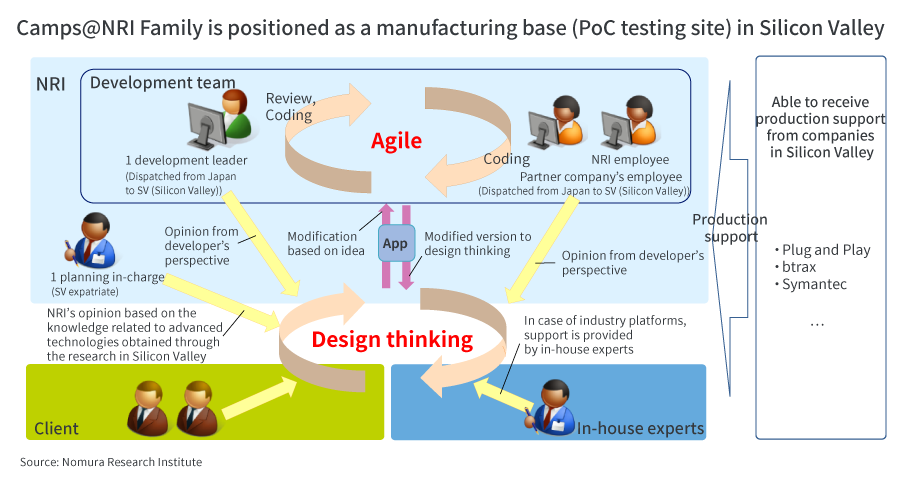
Why Japanese Companies’ Innovation Activities are Struggling in Silicon Valley and How NRI’s “CAMPS” can Help
Many Japanese companies feel that their innovation activities are not developing sufficiently despite sending personnel to Silicon Valley. Ms. Yukari Miyahara from NRI America explains how NRI’s CAMPS (Circle as Mobile Phone Sandbox), can navigate companies to success.
Severe shortage of resources to promote PoCs in Silicon Valley
What challenges do companies face as they struggle with innovation in Silicon Valley?
The biggest challenge is the labor shortage. Due to the Japanese company legacy system of sending only one or two secondees from the Japanese headquarters to manage global business, many Japanese companies’ global offices are too busy with day-to-day administrative duties and operations to allocate sufficient resources to innovation. Additionally, in many cases the Japanese secondees do not have an IT background, which makes them incapable of locating suitable startups even if the project topic is clear. There are even projects which the process is stopped at the conceptual verification stage. Internal approval and decision-making procedures on the Japanese headquarters side also take time, making it difficult to keep up with the Silicon Valley pace of execution.
Furthermore, there is the communication barrier. Language is always an issue, but more importantly, we have to determine the actual competencies of startups that are hungry for funding and support irrespective of their actual current capability, and decide whether we can work with them. Apart from building relationships of trust through face-to-face meetings, it is also necessary to obtain support from local experts, and collect information from other Japanese companies operating locally. However, many Japanese companies do not have the necessary local resources to do so.
In addition to the above burdens, Japanese headquarters secondees must also take the initiative in areas that are supported by specialists in Japan, such as research on contractual relationships and intellectual property rights. Therefore, such secondees tend to be mid-level employees who can perform a range of tasks on their own. I feel that this is an environment where it is difficult to send young employees who might get overwhelmed by new experiences.
CAMPS to Support Innovation Activities
Please tell us how you developed a structure called CAMPS to support such companies.
Our mission is to promote innovation activities and associated PoCs by Japanese companies. Therefore, we want to flexibly support our client companies in various processes as per their requirements, such as searching for startups suitable for their ideas, bridging collaborations and planning in those areas that the local startups cannot handle by themselves. We are also considering whether we can make a system where NRI employees can be involved in this project in Silicon Valley. We have already developed a program that allows employees of partner companies and client companies to participate in this initiative.
Currently, we invite participants from our client companies, partner companies and NRI every quarter to CAMPS, and conduct PoCs with startups for two months in Silicon Valley. NRI America has partnered with the accelerator Plug and Play. In addition to the search and selection of appropriate startups and contract-related tasks, they also arrange necessary resources such as local accommodation and workplaces and create an environment where participants can concentrate on development. This partnership also serves the purpose of developing NRI talent, and it is distinguished by its ability to reduce the barriers to participation in PoCs in Silicon Valley.

Utilization of Silicon Valley Apps
The name CAMPS contains the word "Mobile". Is that its focus?
Since the Insurance Solution Division played a central role in starting this project, it is being seen as a testing ground for the development of apps mainly in the insurance and finance sectors. We believe that easy to develop mobile apps are suitable since the time period is limited.
A paperless, smartphone-centric life is prevalent in Silicon Valley. For example, everything from housing arrangements and insurance coverage to the process of admission and distribution of materials for conferences is done via apps by people of all ages. When information is entered at the time of participation in an event, one may get invitations from people from all around the country to set up meetings. This helps people expand their networks and business opportunities. From the standpoint of a developer, Silicon Valley apps do not seem technologically cutting-edge. However, they are well placed to help the user combine ideas and technologies in presenting the right information at the right time.
How is the response to CAMPS?
Many participants have been able to realize the previously stagnant PoC, and as per our partner companies who do not have local bases, CAMPS has been helpful in training developers. Young NRI employees also seem highly motivated by this collaboration with startups and clients and by their participation in local events. As we are still finding our way, I’m grateful to my colleagues and team, without whose support this would not have been possible. In the future, we would like to expand the activities of CAMPS by enhancing the content in order to provide an experience unique to Silicon Valley.
Profile
-
Ms. Yukari Miyahara
* Organization names and job titles may differ from the current version.